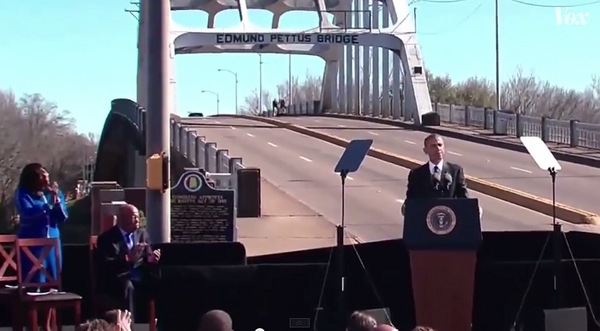Gran discurso de Obama en Selma, Alabama, en el 50º aniversario de uno de los momentos más dramáticos de la lucha por derechos civiles en EEUU.
Como es habitual en Obama, y en este punto tenemos que recordar que es el presidente del país y por tanto un producto del sistema político norteamericano, toca todas las teclas de forma inteligente. Reconoce los logros del sistema y al mismo tiempo le desafía con la idea de que la lucha no ha terminado, que el hecho de que la cobertura legal de esos derechos por los que hubo que derramar sangre no supone de forma automática que esos derechos estén completamente reconocidos.
Sobre la primera parte:
«We do a disservice to the cause of justice by intimating that bias and discrimination are immutable, or that racial division is inherent to America. If you think nothing’s changed in the past fifty years, ask somebody who lived through the Selma or Chicago or L.A. of the Fifties. Ask the female CEO who once might have been assigned to the secretarial pool if nothing’s changed. Ask your gay friend if it’s easier to be out and proud in America now than it was thirty years ago. To deny this progress — our progress — would be to rob us of our own agency; our responsibility to do what we can to make America better».
Sobre la segunda parte:
«Of course, a more common mistake is to suggest that racism is banished, that the work that drew men and women to Selma is complete, and that whatever racial tensions remain are a consequence of those seeking to play the «race card» for their own purposes. We don’t need the Ferguson report to know that’s not true. We just need to open our eyes, and ears, and hearts, to know that this nation’s racial history still casts its long shadow upon us. We know the march is not yet over, the race is not yet won, and that reaching that blessed destination where we are judged by the content of our character — requires admitting as much».
Como estos discursos se escriben y reescriben muchas veces, hay que anotar un error tremendo que es raro que nadie haya detectado. Pero es difícil decirle al jefe del Estado que se está pasando en este párrafo:
«Because the single most powerful word in our democracy is the word «We.» We The People. We Shall Overcome. Yes We Can. It is owned by no one. It belongs to everyone. Oh, what a glorious task we are given, to continually try to improve this great nation of ours».
Oh, man. Poner al mismo nivel la primera frase de la Constitución, el grito mítico de la lucha por los derechos civiles y un eslogan de campaña.
—
—Texto íntegro del discurso de Obama.
–El discurso dura algo más que media hora. Vox ha extractado tres momentos impactantes.
–Could a Selma-like protest happen today? Probably not.
.@nytimes front page on Bloody Sunday: "Alabama Police Use Gas and Clubs To Rout Negroes" #Selma50 pic.twitter.com/4b4qmZTHoq
— Ari Berman (@AriBerman) marzo 8, 2015
ABC interrupted premiere of Judgment at Nuremberg to show footage of Bloody Sunday. This is what they saw #Selma50 pic.twitter.com/8lz2QutMsB
— Ari Berman (@AriBerman) marzo 7, 2015
John Lewis nearly died 50 years ago on Bloody Sunday. The march changed American history forever #Selma50 pic.twitter.com/muBBO5QbFx
— Ari Berman (@AriBerman) marzo 7, 2015
40,000 people saw Obama speech in Selma yesterday. 25,000 marched from Selma to Montgomery in 1965 #Selma50 pic.twitter.com/BEC3BgJSkE
— Ari Berman (@AriBerman) marzo 8, 2015
395 voting restrictions introduced in 49 states from 2011-2015 http://t.co/4kOWtA7UyR #Selma50 pic.twitter.com/qDzWOfa3Mh
— Ari Berman (@AriBerman) marzo 7, 2015


